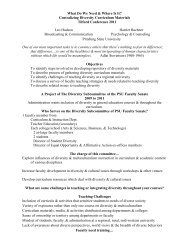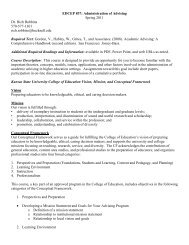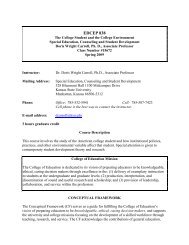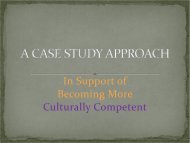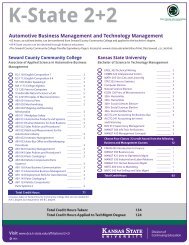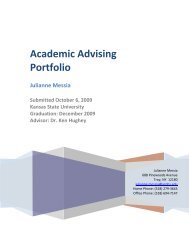David Freitag – KSU Capstone Project - K-State Division of ...
David Freitag – KSU Capstone Project - K-State Division of ...
David Freitag – KSU Capstone Project - K-State Division of ...
Create successful ePaper yourself
Turn your PDF publications into a flip-book with our unique Google optimized e-Paper software.
(his) progress toward goal achievement” (Brown & Rivas, 1995, p. 124). An advisor can<br />
help Javier with identifying specifically what he needs to learn and what resources are<br />
available to him for achieving his goals <strong>–</strong> in this case a better academic performance as<br />
evidenced by higher grades and higher satisfaction with his efforts at learning the material.<br />
Because <strong>of</strong> his poor academic results and a lack <strong>of</strong> support from his family, Javier<br />
appears to be questioning his decision to attend college. Many Native American students<br />
feel pressure to quit school and return home even if they are doing well in school. Although<br />
as educators we believe education is important, advisors should be aware how their<br />
worldview affects their interactions with students who may have a different worldview<br />
(Cunningham, 2003). Doing poorly in school can be used as an easy excuse to drop out if<br />
not challenged by an advisor.<br />
Native American students may also have to respond to “American Indian”<br />
stereotypes, feelings <strong>of</strong> intellectual inferiority, and feeling more like a “Native American<br />
student” rather than just a “student.” They may see the campus as hostile and not<br />
supportive <strong>of</strong> their needs (Clark & Kalionzes, 2008).<br />
Advisors should be comfortable with diversity and with advising students different<br />
from themselves. To better advise Native American students advisors should strive to<br />
understand the student’s family and tribal background, build trust with the student,<br />
understand identity development <strong>of</strong> minority students, develop multicultural<br />
competencies, and make an attempt to be in the student’s world by seeing students outside<br />
the formal advising environment (Clark & Kalionzes, 2008). It is important for advisors to<br />
“use specific advising approaches and demonstrate cultural awareness and competency to<br />
19




